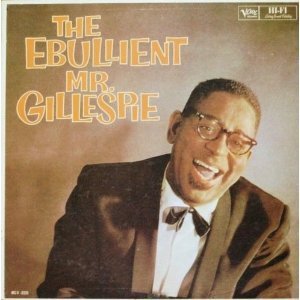Short & Sweet Treats discussion
Take a Coffee Break...
>
Word of the Day
message 351:
by
Julia
(last edited Feb 04, 2014 05:57PM)
(new)
Feb 04, 2014 05:54PM
 Nice one, Louis--Melville is one of my favorite authors, and I like his use of the word here. If all of us were attentive, strict, and exact in how we care for our friends, loyalty would have real meaning.
Nice one, Louis--Melville is one of my favorite authors, and I like his use of the word here. If all of us were attentive, strict, and exact in how we care for our friends, loyalty would have real meaning.
reply
|
flag
 resplendent
resplendentPRONUNCIATION:
(ri-SPLEN-dent)
MEANING:
adjective: Shining; brilliant; radiant; splendid.
ETYMOLOGY:
From Latin resplendere (to shine brightly), from re- (intensive prefix) + splendere (to shine). Earliest documented use: 1440.
USAGE:
"Gilderoy Lockhart was walking onto the stage, resplendent in robes of deep plum."
J.K. Rowling; Harry Potter and the Chamber of Secrets; Bloomsbury; 1998.

 scud
scudPRONUNCIATION:
(skud)
MEANING:
verb intr.: 1. To run or move swiftly.
2. In nautical parlance, to run before a gale with little or no sail set.
noun: 1. The act of scudding.
2. Clouds, rain, mist, etc. driven by the wind.
3. Low clouds beneath another cloud layer.
ETYMOLOGY:
Of uncertain origin, possibly from Middle Low German schudden (to shake). Earliest documented use: 1609.
USAGE:
"The moon was bright, but the clouds scudding across kept throwing them [Harry et al] into darkness."
J.K. Rowling; Harry Potter and the Philosopher's Stone; Bloomsbury; 1997.

 slipstream
slipstreamPRONUNCIATION:
(SLIP-streem)
MEANING:
noun: 1. A stream of air (or another fluid) forced backwards by a propeller.
2. The area of reduced pressure behind a fast-moving object.
verb tr., intr.: 3. To follow behind a vehicle to take advantage of decreased wind resistance.
ETYMOLOGY:
From Middle Dutch slippen (to slip), ultimately from the Indo-European root lei-/slei- (slimy), which also gave us slime, lime, slick, slippery, schlep, and oblivion + Old English stream, ultimately from the Indo-European root sreu- (to flow), which also gave us maelstrom, diarrhea, rhythm, and Sarayu (a river in India). Earliest documented use: 1913.
USAGE:
"The owl was so small, in fact, that it kept on tumbling over in the air, buffeted this way and that in the train's slipstream."
J.K. Rowling; Harry Potter and the Prisoner of Azkaban; Bloomsbury; 1999.
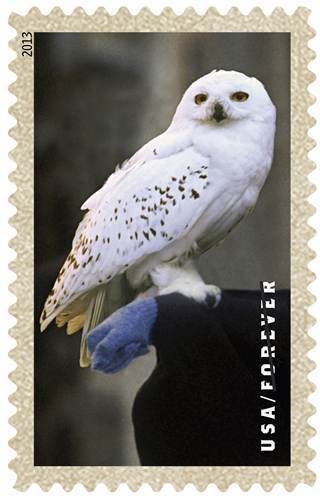
 Ribald: (adjective) vulgar or indecent in speech, language, etc.; coarsely mocking, abusive, or irreverent; scurrilous.
Ribald: (adjective) vulgar or indecent in speech, language, etc.; coarsely mocking, abusive, or irreverent; scurrilous.
 BODACIOUS
BODACIOUS (bō-dā′shəs)
1. Remarkable; prodigious.
2. Audacious; gutsy
ORIGIN:
probably blend of "bold" and "audacious"
First Known Use: 1832
Some people prefer the story that "bodacious" is a reference to Boudicca (also spelled Boudica or Boudicea), the queen of the Iceni, a tribe based in modern day Norfolk, in eastern England. In C.E. 60, she led a revolt against the Romans that resulted in the destruction of two (possibly three) Roman settlements and almost drove the empire off the island.
Much of what we know about her comes from two Roman writers, Publius Cornelius Tacitus (C.E. 56-117) and Cassius Dio (C.E. 150-235).
The revolt began after the death of her husband, Prasutagus, around C.E. 60. Tacitus writes that the Romans seized Iceni property, flogged Boudicca and raped her two daughters. She then raised an army and led a rebellion against the Romans which, after initial success, was crushed at the Battle of Watling Street. Boudicca killed herself. A statue of her with her two daughters stands in London.

 Louis wrote: "Ribald: (adjective) vulgar or indecent in speech, language, etc.; coarsely mocking, abusive, or irreverent; scurrilous."
Louis wrote: "Ribald: (adjective) vulgar or indecent in speech, language, etc.; coarsely mocking, abusive, or irreverent; scurrilous."
 heinous
heinousPRONUNCIATION:
(HAY-nuhs)
MEANING:
adjective: Extremely wicked.
ETYMOLOGY:
From Old French haine (hatred), from hair (to hate). Earliest documented use: 1394.
USAGE:
"You have been brought here before the Council of Magical Law ... so that we may pass judgment on you, for a crime so heinous."
J.K. Rowling; Harry Potter and the Goblet of Fire; Bloomsbury; 2000.

 sepulchral
sepulchralPRONUNCIATION:
(suh-PUHL-kruhl)
MEANING:
adjective:
1. Relating to a grave or a burial.
2. Gloomy, serious, or sad.
ETYMOLOGY:
From Latin sepulcrum (grave, tomb), from sepelire (to bury). Earliest documented use: 1615.
USAGE:
"A sallow-skinned wizard with a very mournful face got in. 'Morning, Arthur', he said in a sepulchral voice."
J.K. Rowling; Harry Potter and the Order of the Phoenix; Bloomsbury; 2003.

 HARBINGER
HARBINGER1. a person who goes ahead and makes known the approach of another
2. anything that foreshadows a future event; omen; sign
ORIGIN
Middle English "herbergere", from Anglo-French, host, from "herberge" camp, lodgings, of Germanic origin; akin to Old High German "heriberga".
First Known Use: 14th century
EXAMPLE:
The raven, traditionally the wolf's companion, is known as a trickster, oracle, and harbinger.
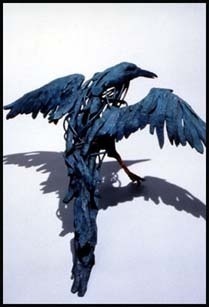
 chowderhead
chowderheadpronunciation\CHOW-der-hed\
DEFINITION
noun
: dolt, blockhead
EXAMPLES
"No matter how hard I have tried I cannot stop them from yelling 'Chowderhead!' and trying to poke one another's eyes out…."
— From Elizabeth Berg's 2002 novel True to Form
"Many of my fellow Americans enjoy the sport of football…. If you're like me, you often opine that you could run the team, the program, or the franchise in immeasurably greater fashion than the millionaire chowderheads currently employed to do so."
— From an article by Timothy Geigner at Techdirt.com, January 1, 2014
DID YOU KNOW?
The "chowder" in "chowderhead" is neither New England or Manhattan (though one could speculate that a chowderhead has either type of clam chowder for brains). "Chowderhead" is a mispronunciation of "jolterhead," a derivative of the 16th-century insult "jolt head." Before being extended to a thickheaded person (i.e., a blockhead), the term "jolt head" was used literally for a large, heavy head. The etymology of "jolt head" is obscure; the term is likely connected somehow to the "jolt" that means "an abrupt jerky blow or movement," but the exact nature of the connection is not known.
http://www.merriam-webster.com/word-o...

 BURGEON
BURGEONbur-juhn
a : to send forth new growth (as buds or branches): sprout, bloom
b: to grow and expand rapidly : flourish
EXAMPLES
In spring, we can't wait to see new plants begin to burgeon.
ORIGIN
Middle English "burjonen", from Anglo-French "burjuner", from "burjun" bud
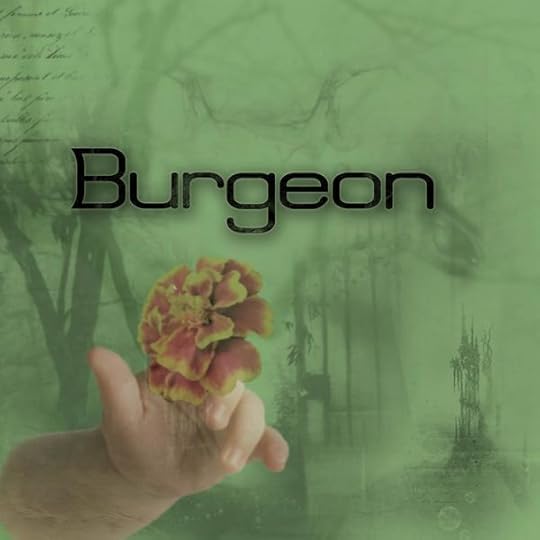
 higgledy-piggledy
higgledy-piggledyPRONUNCIATION:
(HIG-uhl-dee PIG-uhl-dee)
MEANING:
adverb: In a disordered or random manner.
adjective: Confused; jumbled.
ETYMOLOGY:
Of unknown origin, perhaps referring to the herding of pigs. Earliest documented use: 1598.
USAGE:
"Owl feathers, apple cores, and sweet wrappers littered the floor, a number of spell books lay higgledy-piggledy among the tangled robes on his bed."
J.K. Rowling; Harry Potter and the Half-Blood Prince; Bloomsbury; 2005.
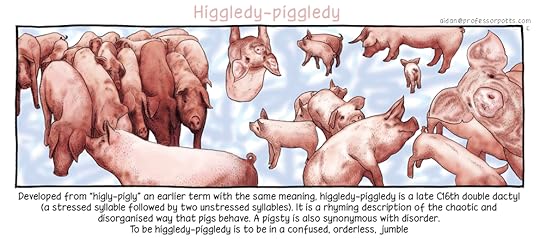
 OBSTREPEROUS
OBSTREPEROUS(ob-STREP-or-us)
marked by unruly or aggressive noisiness
stubbornly resistant to control
ORIGIN
Latin "obstreperous", from "obstrepere" to clamor against, from ob- "against" + strepere "to make a noise"
First Known Use: circa 1600

 canker
cankerPRONUNCIATION:
(KANG-kuhr)
MEANING:
noun:
1. A source of corruption or decay.
2. Ulcerous sores in the mouth; also any of various diseases affecting animals and plants.
verb tr., intr.:
1. To corrupt or to become corrupted.
2. To infect with or be infected with canker.
ETYMOLOGY:
From Old English cancer (crab, tumor). Ultimately from the Indo-European root kar-/ker- (hard), which also gave us standard, cancer, and hard. Earliest documented use: 1384.
USAGE:
"And in your family, so in the world ... we shall cut away the canker that infects us until only those of the true blood remain."
J.K. Rowling; Harry Potter and the Deathly Hallows; Bloomsbury; 2010.

 grok
grokPRONUNCIATION:
(grok)
MEANING:
verb tr.: To understand deeply and intuitively.
ETYMOLOGY:
Coined by Robert A. Heinlein in his science-fiction novel Stranger in a Strange Land. Earliest documented use: 1961.
NOTES:
In Stranger in a Strange Land, Heinlein describes grok as a Martian word meaning "to drink". That's the literal meaning, however, figuratively it means to understand something in a profound way. To grok something is to be one with it in a way that the observer and the observed become merged.
USAGE:
"Any first-time Apple user immediately groks the nature of the device."
Melvin Bukiet; Me and My Mac; The Chronicle of Higher Education (Washington, DC); Oct 16, 2011.

Stranger in a Strange Land
 Great word, Jen--I remember reading the book a long time ago and have never forgotten the idea of "grok".
Great word, Jen--I remember reading the book a long time ago and have never forgotten the idea of "grok".
 ONEROUS
ONEROUS(ON-er-us)
burdensome, oppressive, or troublesome; causing hardship: onerous duties.
From Latin onerosus (“burdensome”), from onus (“load”).

 @Jen & Julia - as soon as I saw "grok" I thought of Stranger in a Strange Land. Thanks for the memory.
@Jen & Julia - as soon as I saw "grok" I thought of Stranger in a Strange Land. Thanks for the memory.
 What a great thread, I probably will not post a word but rather try and use the words you all have posted in my daily conversations.
What a great thread, I probably will not post a word but rather try and use the words you all have posted in my daily conversations.
 waldo
waldoPRONUNCIATION:
(WAL-doh)
MEANING:
noun: A device for manipulating objects by remote control, for example, a remotely-operated arm.
ETYMOLOGY:
After Waldo F. Jones, an inventor in a science-fiction story by Robert A. Heinlein. Earliest documented use: 1942.
NOTES:
Modern applications of waldo as a remote manipulator are in surgery, space, and in working in hazardous conditions, such as those involving radiation.
USAGE:
"I stuck my hand back into the waldo ... The remote arms peeled back the thin metal of the gondola."
Ben Bova; Venus; Tor; 2000.
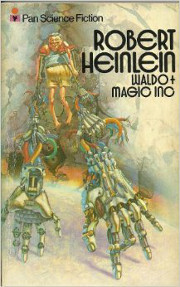
Waldo and Magic, Inc
 SURREPTITIOUS
SURREPTITIOUSWhen someone behaves in a surreptitious way, they're being secretive. They're doing something that they don't want to be seen doing.
ORIGIN
Middle English, from Latin "surrepticius", to snatch secretly

 INEFFABLE
INEFFABLEtoo great, powerful, beautiful, etc., to be described or expressed in words
EXAMPLE:
I feel an sense of ineffable wonder when contemplating the stars.
ORIGIN
Middle English, from Latin ineffabilis, from in- + effabilis "capable of being expressed
First Known Use: 14th century

 tardis
tardisPRONUNCIATION:
(TAR-dis)
MEANING:
noun:
1. A time machine.
2. Something that is much bigger than it appears from the outside.
ETYMOLOGY:
From TARDIS, a time machine in the British science-fiction TV series, Doctor Who. Earliest documented use: 1969.
NOTES:
In the Doctor Who television show, the title character, known simply as the Doctor, travels through time and space in TARDIS that looks like a police call box from the outside. It's much bigger on the inside though, and includes a swimming pool, a library, and more. The name TARDIS is explained as an acronym for Time and Relative Dimension in Space.
USAGE:
"This revival disco tune is a must on any party list. For those born post-1980, it's like taking a tardis back to the heady heights of the 70s funk revolution."
Paula Yeoman; Songs for Summer; The New Zealand Herald (Auckland); Dec 29, 2013.
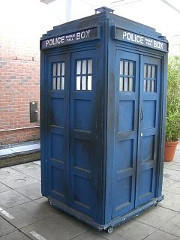
 Julia wrote: "INEFFABLE
Julia wrote: "INEFFABLEtoo great, powerful, beautiful, etc., to be described or expressed in words
EXAMPLE:
I feel an sense of ineffable wonder when contemplating the stars.
ORIGIN
Middle English, from Lati..."
Oh I often feel this way after reading a really good book or taking a hike :)
 Jen ƸӜƷ wrote: "tardis
Jen ƸӜƷ wrote: "tardisPRONUNCIATION:
(TAR-dis)
MEANING:
noun:
1. A time machine.
2. Something that is much bigger than it appears from the outside.
ETYMOLOGY:
From TARDIS, a time machine in the British scienc..."
OH JEN, I'm a BIG "Whovian", along with my daughter! Here's a picture of the locket she gave me at Christmas :-) The reverse side says, "I love you" in Gallifreyan. http://tardis.wikia.com/wiki/Gallifre...

 It really is--the shop is on etsy, with many other clever creations: http://www.etsy.com/listing/118225605...
It really is--the shop is on etsy, with many other clever creations: http://www.etsy.com/listing/118225605...
 HOARFROST
HOARFROSTHoarfrost occurs when there is high humidity in the air and the tree limbs (or grass or even the antenna on your vehicle) have a temperature below the Dew Point. The water vapor from those surfaces skips the dew process and goes directly to a frozen state.
It is recorded in Old English as expressing the resemblance of the white feathers of frost to an old man's beard. The word itself comes from "har" meaning "grey, venerable, old".

 triffid
triffidPRONUNCIATION:
(TRIF-id, TRY-fid)
MEANING:
noun: An out-of-control plant that overruns everything around it. Also, anything that behaves in this manner.
ETYMOLOGY:
After triffids, a species of plants in the science-fiction novel, The Day of the Triffids, by John Wyndham. From Latin tri- (three) + findere (to split). Earliest documented use: 1951.
NOTES:
In the novel, The Day of the Triffids, triffids are a species of large plants with three leg-like structures that enable them to move. Triffids have poisonous stings and attack people around the world.
USAGE:
"Ecologists reckon that triffid weeds, Monterey pines, and dozens of other invasive plants already extend over one-twelfth of South Africa."
Andrew Balmfor; Wild Hope; The University of Chicago Press; 2012.
"In a triffid's world, the only thing that matters is making money and the ability to make more money."
Rusty Markland; The World Hates A Salesman; Xlibris; 2011.

The Day of the Triffids
 frankenstein
frankensteinPRONUNCIATION:
(FRANG-kuhn-styn)
MEANING:
noun:
1. A creation that gets out of control and brings harm to its creator.
2. One who creates something that brings ruin to himself.
3. A monster having human appearance.
ETYMOLOGY:
After Victor Frankenstein, who creates a monster from parts of corpses in Mary Shelley's 1818 novel, Frankenstein. Earliest documented use: 1827.
NOTES:
In the story, Frankenstein was the creator, not the monster. We should be calling the creation "Frankenstein's monster", but it's out of the control of the novelist now, and the monster itself is called Frankenstein. The prefix franken- has been coined as an uncomplimentary moniker for artificially created things. For example, genetically-modified foods are often called frankenfoods (see frankenfish).
USAGE:
"The Talos-state is no longer a servant of society; it has been transformed into a Frankenstein that is about to move against his inventors."
Kostas A. Lavdas, et al; Stateness and Sovereign Debt; Lexington Books; 2013.

Frankenstein
 SPECIOUS
SPECIOUSattractive, but false
Specious is pronounced "SPEE-shuhs." Something that is specious is attractive in a deceptive way, and if you follow the word's etymology, you'll see why. In Middle English, this adjective meant "attractive," from Latin speciōsus "showy, beautiful."
Use specious to describe an argument that seems to be good, correct, or logical, but is not so. "We live on the earth; therefore, the earth must be the center of the universe" has been proven to be a specious theory of the solar system.

Books mentioned in this topic
The Clicking of Cuthbert (other topics)The Crucible (other topics)
A History of Modern Drama, Volume I (other topics)
Toy Stories: Photos of Children from Around the World and Their Favorite Things (other topics)
The Book of Life (other topics)
More...
Authors mentioned in this topic
Leo Tolstoy (other topics)P.G. Wodehouse (other topics)
Leonardo da Vinci (other topics)
Theodore Roethke (other topics)
David Krasner (other topics)
More...








